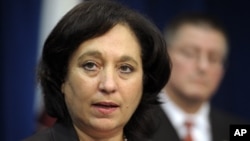The head of the Drug Enforcement Administration, Michele Leonhart, announced her retirement Tuesday afternoon, Attorney General Eric Holder said in a statement.
Leonhart had faced mounting pressure to resign from members of Congress who questioned her competence in the wake of a scathing government watchdog report detailing allegations that agents attended sex parties with prostitutes.
Holder said Leonhart, a career drug agent who has led the agency since 2007 and is the second woman to hold the job, will leave the agency in mid-May.
"Michele has led this distinguished agency with honor, and I have been proud to call her my partner in the work of safeguarding our national security and protecting our citizens from crime, exploitation and abuse,'' Holder said, crediting her with helping to dismantle violent drug trafficking organizations.
Leonhart had been widely criticized for her response to the critical report on her agency, and a group of lawmakers said in a statement that she was ``woefully unable to change'' the agency's culture.
Following a disastrous appearance before the House Oversight Committee last week, a majority of the committee said they had lost confidence in her and said she "lacks the authority and will to make the tough decisions required to hold those accountable who compromise national security and bring disgrace to their positions.''
The Justice Department report that jeopardized Leonhart's job recounted allegations that drug agents attended sex parties with prostitutes, some funded by local drug cartels, in a foreign country. The DEA said the incidents happened in Colombia.
Lawmakers have criticized the DEA and Leonhart specifically for what they described as lenient punishments for agents accused of wrongdoing.
Leonhart has previously been the target of online petitions calling for her ouster after she distanced herself from the administration's stance on legalized marijuana, seen as a hands-off approach that lets states legalize marijuana so long as it is state-regulated. Marijuana remains illegal under federal law and is classified by the DEA as a Schedule 1 drug, along with drugs such as heroin and peyote.
Leonhart also declined to fully endorse sentencing reform efforts supported by the Justice Department, and the agency has been criticized by privacy advocates for its use of a sweeping database of phone calls made from the United States to multiple foreign countries. The agency acknowledged that database in a court filing involving a man accused of conspiring to illegally export goods and technology to Iran, but said it was no longer in use.
During Leonhart's tenure the agency was responsible for a variety of notable criminal cases, including assisting in the 2014 capture of Mexico's Joaquin "El Chapo'' Guzman, long considered one of the most powerful drug traffickers in the world.
There also were scandals, including the arrest of a California college student who was left alone in a holding cell for five days without food or water. The April 2012 incident left Daniel Chong in grave physical health and led to a $4.1 million settlement and nationwide changes in the agency's detention policies.
US Drug Enforcement Official's Resignation Expected

WASHINGTON —



